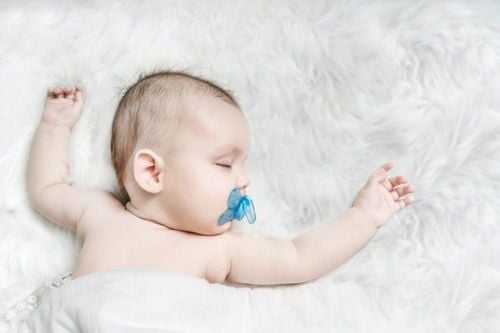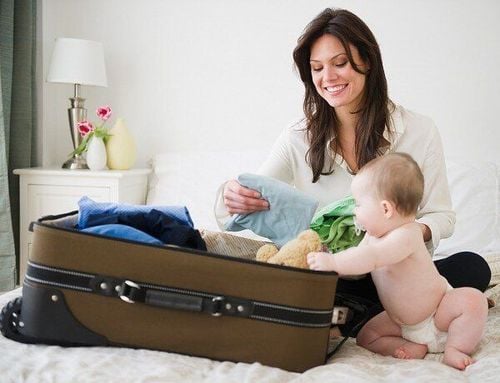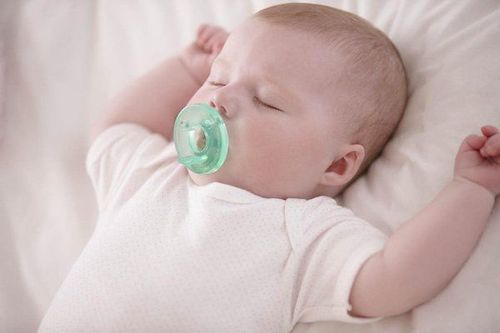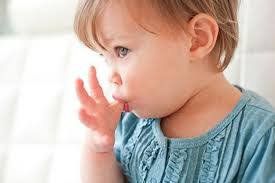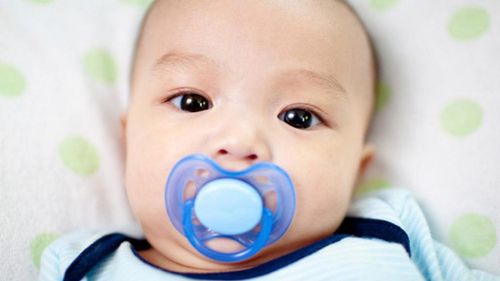This is an automatically translated article.
The article is professionally consulted by Master, Doctor Ngo Thi Oanh - Pediatrician - Pediatrics - Neonatology - Vinmec Ha Long International HospitalThere are certain benefits of pacifiers to babies that cannot be denied, including the prevention of sudden infant death syndrome (SIDS). However, babies can have some developmental problems if they use pacifiers for too long. For some parents, pacifiers are considered an indispensable useful item for children. Using a pacifier makes it easier for babies to fall asleep, and can even comfort them when they are fussy. However, you should not abuse and give children too long no matter how good they are.
1. Notes when choosing a pacifier
When purchasing a pacifier, be sure to follow the American Academy of Pediatrics guidelines:Look for pacifiers with soft nipple pads (some double-sided nipples can break). The shield on the pacifier must be made of strong plastic with air vents and must be at least 2.5cm wide so that the baby cannot swallow. Buy pacifiers that are safe in the dishwasher and clean them this way regularly until your baby is 6 months old; then, clean the pacifier regularly with soap and hot water. Pacifiers come in two sizes: 0-6 months and 6 months and up; For baby's comfort, make sure they are using the correct sized pacifier. For your baby's safety, never tie a pacifier around your baby's hand, neck, or crib railing. Use a pacifier clamp instead. Never use bottle nipples and rings in place of pacifiers; The nipple can detach from the ring and pose a choking hazard. Regularly inspect pacifiers for damage and replace them if the pacifier is discolored or torn.
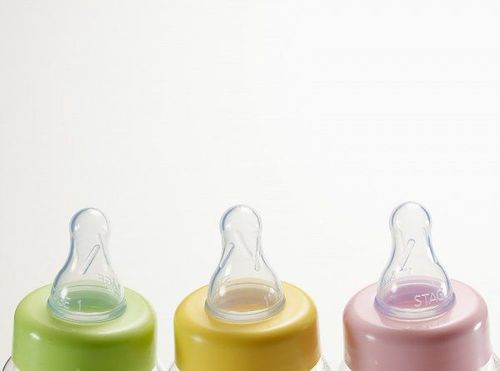
Thường xuyên kiểm tra núm vú giả để thay thế nếu chúng bị đổi màu hoặc bị rách
2. Body concept of pacifier use
According to Richard Dowell, PhD, a pediatric neuropsychologist at Evangelical Community Hospital in Lewisburg, Pennsylvania, babies are born with an innate need to suckle a pacifier. Newborns rely on this "pacifier reflex" not only to suck, but also as a way to soothe themselves. “Infants have no other mechanism to control their pain,” explains Dowell. Newborns cannot get their own milk when hungry; unable to ask for blankets when cold; Can't use hands to control everything. The pacifier is the way to calm the baby."Therefore, if the pacifier is not used, the baby will suck on the thumb, finger, bottle or breast. every two hours, you can use a pacifier for your baby and be aware that in such cases a pacifier can help meet a baby's need for non-nutritive feeding while the mother needs time
In this case, just make sure breastfeeding is well established before giving the pacifier to your baby. For babies who are having trouble learning to breastfeed, a pacifier. can form bad habits in children.
3. Pros and cons of pacifiers
Although many parents worry that pacifiers can harm their children's teeth, in reality, pacifiers usually do not affect children under 2 years of age. According to a pediatric dentist in Dickson, Tennessee, "From an oral health perspective, it's best to limit pacifier use by age 2 and stop completely by age 4. After age 4, pacifiers should be completely removed. A pacifier can cause a number of problems affecting chewing, speech and teething in children. Calling it an orthodontic pacifier doesn't make a difference.It's important for parents to note the frequency and intensity of their child's pacifier habit.3.1. Advantages of pacifiers
Reduce stress: The length of time babies cry increases from birth until about 6 weeks, when babies cry an average of three hours a day. That's when babies feel stressed, says Cynthia R. Howard, MD, MPH, associate professor of pediatrics at the University of Rochester School of Medicine and Dentistry in New York. Pacifiers are definitely calming for babies, which is why pacifiers are so popular. Health Benefits: Proven medical benefits associated with pacifiers have been found in premature babies. According to a 1992 study published in the Swedish journal Acta Pediatrica, breastfed babies gain weight faster. Another study has found that babies who use a pacifier soon after birth develop a habit of sucking earlier and have fewer health complications. Nina L. Shapiro, assistant professor of pediatric otolaryngology at the University of California, Los Angeles, School of Medicine, says: “Putting on a pacifier helps promote oral muscle function and muscle development. Reduced risk of SIDS: Pacifier use has been linked to a reduced risk of sudden infant death syndrome (SIDS), according to several recent studies showing that for infants, pacifier use pacifiers during sleep are 20 times less likely to die from SIDS than babies who don't need a pacifier. The researchers speculate that pacifiers might keep babies sleeping better or maybe keep their tongues forward and away from their airways. But because a cause-and-effect relationship hasn't been clearly proven, researchers aren't sure about pacifier use and the prevention of SIDS.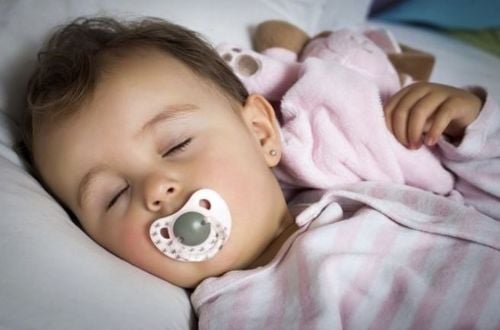
Trẻ sơ sinh sử dụng núm vú giả sẽ có thói quen bú sớm hơn và ít gặp biến chứng về sức khỏe hơn
3.2. Cons of pacifiers
Ear Infections: According to a study published in the journal Pediatrics in 1995, pacifier use was found to be responsible for 25% of ear infections in children under 3 years of age. However, a follow-up study in 2000 (also in Pediatrics) found that limiting pacifier use just before bedtime reduced the odds of children getting ear infections. Experts say that sucking on a pacifier promotes fluid buildup in the ear, which can lead to ear infections. Early weaning: Giving a full-term baby a pacifier can prevent them from getting what they really need, such as food. Indeed, several studies have linked pacifier use to early cessation of breastfeeding. However, a study reported in the Journal of the American Medical Association suggests that pacifiers are probably not the cause of premature weaning. The researchers concluded that their use was a sign of difficulty breastfeeding or decreased motivation to breastfeed. Although the link between pacifiers and breastfeeding is questionable, if you're breastfeeding, it's best to wait a week after your baby is born. If you want to give your baby a pacifier, wait until your baby is 4 to 6 weeks old, because your milk supply is stable at this point.Dental problems: According to a study published in the Journal of the American Dental Association, children over 2 years of age suck on anything, such as thumbs, fingers or pacifiers. There is a higher risk of protruding incisors and/or misalignment of primary teeth. In some cases, these problems persist when the baby has permanent teeth. Even if your baby doesn't have trouble with an ear infection and the dentist doesn't notice any potential problems, you shouldn't give your baby a pacifier for too long. Because this habit in children is also very difficult to break.
Some experts believe that pacifiers can interfere with speech development. If your child often has a pacifier in his mouth, he may babble and speak less often than other children, or the pacifier may distort the baby's voice.
4. When should pacifiers be stopped?
The American Academy of Dentistry (AAPD) recommends that pacifiers should be stopped by the time a child is 3 years old or even earlier. Changes in the baby's facial development may be affected in the case of prolonged pacifier use. Basically, this habit can affect your baby's own oral health if you continue to give your baby a pacifier after the age of 3.5. How to stop baby pacifier
There are many ways to help your baby stop using a pacifier, so choose the one you think works best for your baby. Some parents say they find it easiest to start by limiting daytime use, then directing their children to other activities to gradually eliminate the nighttime habit. Start getting your baby into the habit of going to bed without a pacifier.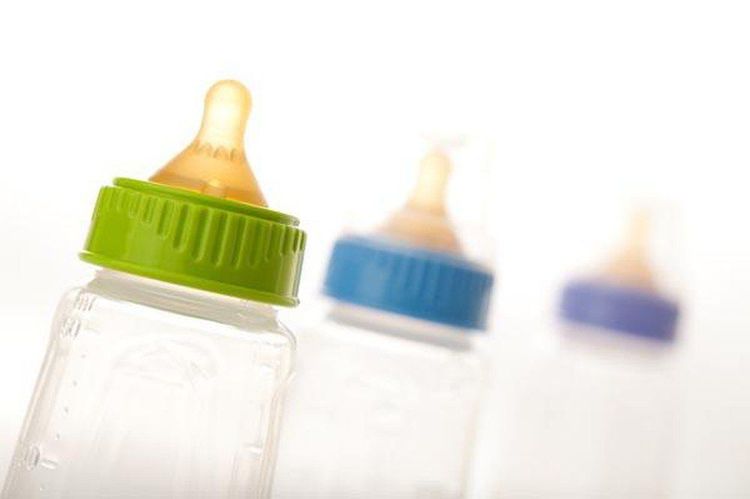
Ngừng sử dụng núm vú giả bắt đầu bằng việc luyện cho trẻ thói quen đi ngủ mà không sử dụng chúng
5.1 Guide to help children stop using pacifiers according to the “Three Day Plan”
Here's how.Day one :
In the morning and before going to bed, tell your child that you can see him wanting to do many things that make him bigger. Tell your child it's a good idea and in three days it'll be time to say goodbye to pacifiers. Tell your child that you know he can do it and that you will do it with him. Hold the conversation for 30 seconds and pay attention to the child's behavior. If your child reacts, reflect back on his feelings - "I know you don't want to" - then continue talking to him. Don't worry that your child will become nervous if given advance warning. According to the experts: “Like adults, children like to prepare themselves physically, psychologically and emotionally for change.”
Day two :
Repeat the same conversation for 30 seconds twice a day, just replace "for three days" with "tomorrow." You need to keep the same tone and manners of your child as the first day.
Third day :
Remind your child that until day three and it's time to clean up the pacifier Act like you're picking up trash and ask your child if he wants your help Even if he refuses and protests, keep collecting pacifiers, put them in a plastic bag and leave them on the front steps for a “recycling truck to pick up.” Explain to your child that pacifiers will be made into new tires or toys. Kids realize there's a purpose to recycling and it's much less uncomfortable for them than if you threw their precious pacifiers in the trash. would easily agree. However, you need to be empathetic but firm, and let your child know that most children will give up using a pacifier within 48 hours.
5.2. Let your baby stop using a pacifier slowly
You can stop your baby from using a pacifier by removing the pacifier in some non-essential situations like when your baby is at home, having fun and playing. Once your child gets used to not having a pacifier at home, eliminate its use outdoors. You don't need to give an explanation. According to experts: “Sometimes we talk too much with our children. All you need to do is: don't bring a pacifier when you go out."Some say: As the holiday approaches, you can tell your child that Santa Claus collects socks both infant pacifiers and toys for all big girls and boys Or you can tell your child that the dentist or doctor wants to collect pacifiers for newborns and if mom If you give a pacifier, your child will receive a special toy. Although the child is very excited about the gift he receives, he may suddenly cry for a pacifier. Like most children, don't recommend it. If your child is too worried, he will soon find other sources of comfort.
Experts agree that pacifiers are perfectly suitable for soothing babies, helping them calm down. However, pediatric dentists recommend pacifier should be limited to 2 years old and stopped by 4 years old to avoid dental problems.
For children to be healthy and develop well, it is necessary to have a nutritious diet in terms of quantity and quality balance. If children are not provided with adequate and balanced nutrients, it will lead to diseases of excess or lack of nutrients, which adversely affect the comprehensive development of children in terms of physical, mental and motor skills.
Children who do not eat properly are at risk of micro-mineral deficiency causing anorexia, growth retardation, malabsorption,... If they notice the above signs, parents should supplement their children with products. The supplement contains lysine, essential micro-minerals and vitamins such as zinc, chromium, selenium, and B vitamins to help fully meet the nutritional needs of children. At the same time, these essential vitamins also support digestion, enhance nutrient absorption, help improve anorexia, and help children eat well.
Parents can learn more:
Signs of zinc deficiency in children
Micronutrient deficiency and failure to gain weight in children
Please regularly visit Vinmec.com website and update useful information to take care of your child. Take care of the baby and the whole family.
Reference source: babycenter.com, parents.com





